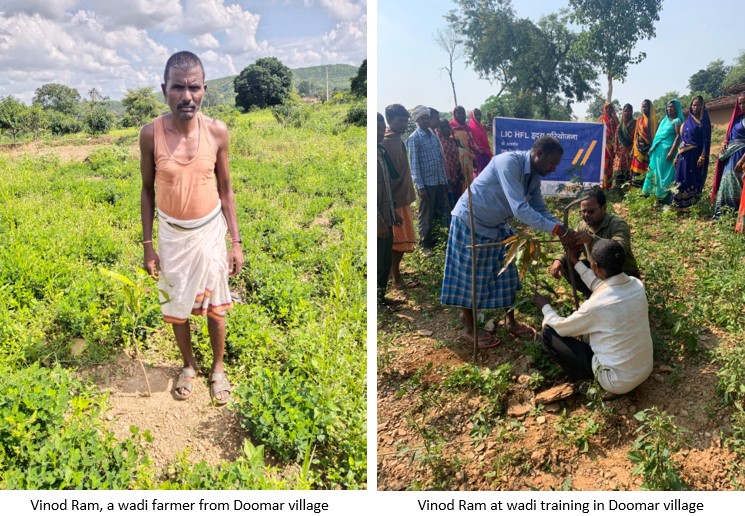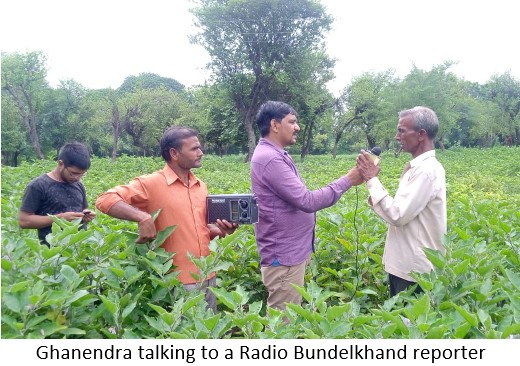|
Ground Story 1 Vinod Ram lives in Tedhwaten Tola with his wife and children. He is the sole breadwinner of the family. Farming is their main occupation. However, the water and soil conditions in Sonbhadra allow them to cultivate the land only for a limited period of the year. Sonbhadra faces acute water scarcity, which makes farming a risk factor in the village. In summers as it is not prudent to do farming so Vinod Ram is forced to grow crops during rainy seasons only. Most farmers in remote villages remain left out from benefitting from any scheme support. One of the main reasons for this is that the marginalised communities have very restricted access to information and resources. Programmes such as LIC HFL HRIDAY project can benefit farmers like Vinod Ram who need support in improving cultivation and, thus, their income generation. As farming is their main source of income, they can benefit through the Wadi development programme of the HRIDAY project. The WADI project aims to not only help them develop another source of income but also make the soil more fertile and enhance its water-holding capacity. Hence, the Wadi model will be beneficial for both the people and the plants. Vinod Ram was approached through mobilisation in Doomar village for farmersí training on the Wadi model. He attended the training and showed interest in developing the model on his land. The team thus contacted him for the Wadi development process. The Agri expert at Development Alternatives counselled Vinod Ram for the training on the Wadi model. He along with other farmers from his village attended the training programme. Though Vinod Ram had a prior understanding of the Wadimodel but needed more counselling as well as financial support to implement the model on his land. As part of the HRIDAY project, he was provided with 100 mango and guava saplings and 10 shagoan and lemon plants for bio-fencing. The team from Development Alternatives facilitated him in the plantation, protection, and maintenance of the plants regularly. In the future Vinod Ram will be further assisted in using organic fertilisers, cattle protection trench, and multilayer farming, which will enable in improving health of the soil and better yield. It takes at least three years to plants to bear fruits. A farmer who has 100 fruit trees can earn Rs 10,000 per month during the season. Planting a mixed variety of plants can help the farmer in generating an alternate income source. He can also do regular farming of crops and vegetables. Hence, the Wadi model will help the farmer in increasing his regular source of income. Vinod Ramís literacy is limited to writing his name only. But this has not affected his understanding of the environmental benefits of planting trees. During the farmers' training in Doomar, he told other participants about the benefits of planting trees. After completing the Wadi training model, Vinod Ram was even able to counsel his fellow farmers on the environmental and economic benefits of plantation on their lands.
Ground Story 2 Ghanendra Kushwaha is a 46 years old farmer who lives with his family of six members in Vinwara village, located 30 km from Taragram. Ghanendra's family owns 5 acres of land. Two years ago, Bundelkhand was severely affected by drought, which made the land of Ghanendra and others completely barren. The most impacted by the drought in Bundelkhand were the farmers with small landholdings. As a result many of them migrated to urban areas, thus abandoning their lands. Ghanendra also migrated because, as he could no longer do farming, he needed to find newer means of generating an income.
Ghanendra Kushwaha is thankful to Radio Bundelkhand and Subhakal programme for helping him resume cultivation. He also wishes that the information related to horticulture should continue to be shared by Radio Bundelkhand so that he can stay in his village and earn a good profit without worrying about leaving his village again.
Ekta Kashyap
Kirandeep Kaur |

 Before
the drought affected his land, Ghanendra used to grow vegetables and
sell them to run his household. However, the crop yield used to be so
low that it had become difficult for him to even recover the cost.
Moreover, for irrigating his patch of land he had to fetch water from
the well as there was no direct water supply to the farms. The pond was
the only source of water for the farmers, but the drought had dried it
up. As a result, Ghanendra decided to leave. The COVID-19 pandemic and
the subsequent lockdown caused such havoc that all the people who had
migrated to urban areas were forced to return to their villages.
Ghanendra also returned to his home with his family. In the initial days
after coming back, he was not engaged in any work or activity. Then
he came to know about Radio Bundelkhand. Taking advantage of the free
time, he started listening to the programmes aired on the radio. He
mainly listened to programmes on agriculture and climate change. Later
on he also became interested in the Subhakal programme. He started
sharing with his family all the information he gained from listening to
the radio programmes, particularly the Subhakal programme. Soon he was able
to convince his family to resume farming on their land. The whole family
took up farming again and worked hard to improve the cultivation.
Ghanendra continued to follow Radio Bundelkhand daily and whenever he
encountered a problem, he called the radio to air his concern. This way
Ghanendra and his family were able to make a huge change in their
farming practice. Through the Subhakal programme, Ghanendra came to know
about the right time to sow seeds. Ghanendra and his family now
patiently wait for the rains to plant vegetable and fruit saplings.
Before
the drought affected his land, Ghanendra used to grow vegetables and
sell them to run his household. However, the crop yield used to be so
low that it had become difficult for him to even recover the cost.
Moreover, for irrigating his patch of land he had to fetch water from
the well as there was no direct water supply to the farms. The pond was
the only source of water for the farmers, but the drought had dried it
up. As a result, Ghanendra decided to leave. The COVID-19 pandemic and
the subsequent lockdown caused such havoc that all the people who had
migrated to urban areas were forced to return to their villages.
Ghanendra also returned to his home with his family. In the initial days
after coming back, he was not engaged in any work or activity. Then
he came to know about Radio Bundelkhand. Taking advantage of the free
time, he started listening to the programmes aired on the radio. He
mainly listened to programmes on agriculture and climate change. Later
on he also became interested in the Subhakal programme. He started
sharing with his family all the information he gained from listening to
the radio programmes, particularly the Subhakal programme. Soon he was able
to convince his family to resume farming on their land. The whole family
took up farming again and worked hard to improve the cultivation.
Ghanendra continued to follow Radio Bundelkhand daily and whenever he
encountered a problem, he called the radio to air his concern. This way
Ghanendra and his family were able to make a huge change in their
farming practice. Through the Subhakal programme, Ghanendra came to know
about the right time to sow seeds. Ghanendra and his family now
patiently wait for the rains to plant vegetable and fruit saplings.